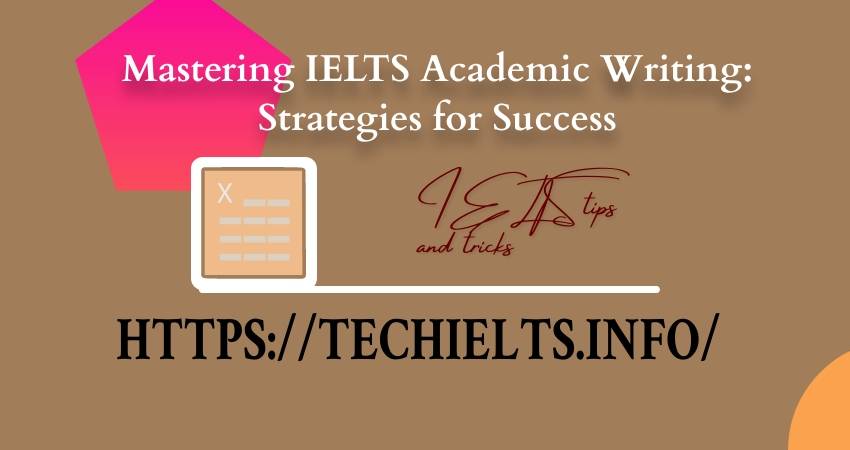For IELTS Academic Writing test, we can teach you everything you need to know. A well-known English test is the International English Language Testing System (IELTS). A lot of people use it to get into better jobs, schools, or colleges. The IELTS is made up of four parts. One of them is the Writing for School test. It checks how well you can write in English for school. There are many ways to do well on the IELTS Academic Writing test. These blog posts have good test-taking tips that you can use to get a good grade. Let’s start right away!

Understanding the IELTS Academic Writing Test
The IELTS General Writing test checks how well you can write for school in English. Its jobs are Task 1 and Task 2. You need to write at least 150 words about what maps, graphs, charts, or diagrams show. You can describe, summarize, or explain what they show. Task 2 asks you to write at least 250 words about a topic that is either educational or interesting to everyone. The test has nine different grades, with nine being the best. You have to follow certain rules to do well on the IELTS Academic Writing test. You also have to use a certain number of words. Take a look.
Overview of the IELTS Academic Writing Test
You can see how well you can write for school on the IELTS Academic Writing test. It looks at how well you write, how well you understand words, and how quickly you finish your work. There are two jobs on the test, and each one has a goal and a word count.
You need to describe, outline, or explain informational graphs, charts, maps, and diagrams in Task 1. You have to sort and look over visual info for this job.
We need a piece on a certain topic for Task 2. Show your theory, give examples, and do research on the subject in a proper, school-like way. This task tests how well you can write a case that makes sense and is well organized.
You need to know how to score on task success, coherence and cohesion, lexical resource, grammatical range and accuracy, and overall result if you want to do well on the IELTS Academic Writing test. If you learn these things and answer practice questions, you can make your writing better and increase your chances of success.
Importance of the IELTS Academic Writing Test for University Admission
To get into college and get registered as a professional writer, you need to pass the IELTS Academic Writing test. Many colleges need IELTS scores, and writing is part of those grades. How you talk and write is important if you want to do well in college. You can do that if you do well on the Academic Writing test.
Professional boards that register people, like those that do medicine and engineering, also need IELTS Academic Writing scores. This helps people talk to each other well enough so they can do their jobs well.
You need to do well on the Academic Writing test if you want to go to higher school. Some schools with strict band score rules might let you in if you get good writing scores.
You might have a better chance of getting into college, getting a job, or going to higher school if you pass the IELTS Academic Writing test..
Breakdown of the IELTS Academic Writing Test
Assemble the IELTS Academic Writing examination component by component in order to determine its workings. Testing consists of two components: Task 1 and Task 2.
Task 1 requires you to define the meanings of graphs, charts, maps, and diagrams and describe them in 150 words, focusing on their key characteristics, trends, and most vital aspects.
Objective 2: Compose a 250-word essay in a formal academic style, addressing a subject of general interest. You should include your opinion, a case, and an analysis of the subject in it.
Your formal language, organization, coherence, and academic writing are all evaluated in both tasks. A comprehensive understanding of the requirements for each assignment is imperative for successful completion of the IELTS Academic Writing examination..
Components of the IELTS Academic Writing Test
For each task on the IELTS Academic Writing examination, you must have a thorough understanding of the prerequisites.
Task 1 requires the user to proficiently assess visual data, identify significant components, patterns, or comparisons, and furnish a minimum summary of 150 words comprising the information. Acquiring high scores requires proficiency in vocabulary, grammar, task completion, coherence, and cohesiveness.
Task 2 requires you to argue, provide examples, and examine the topic in a formal, academic manner. In at least 250 words, you must state your position, back it with appropriate evidence, and organize your ideas. High scores need task achievement, coherence, cohesion, vocabulary, grammar, and lexical resource.
You may confidently take the IELTS Academic Writing test and maximise your score by understanding each task’s components and skills.
How is the IELTS Academic Writing Test Structured?
The IELTS Academic Writing test is arranged as follows on test day:
Task 1: You will be presented with graphs, charts, maps, or diagrams, along with a query or task directive. Visual data analysis and a 150-word personal summary, explanation, or description are required. The task must be finished within a time constraint of twenty minutes.
You will be given a query or assignment and a subject of general interest for the second assignment. On the subject, a 250-word scholarly essay is required. This should be finished in forty minutes.
Organization, composition, and response-taking all require meticulous attention to time management. Through the improvement of time management abilities, timed writing practice can facilitate the expeditious finishing of both assignments..
Strategies to Ace the IELTS Academic Writing Test
Effective tactics and preparations are needed to score well on the IELTS Academic Writing exam. These test-taking tips will help you succeed:
Identify these as task requirements: Read the task notes carefully to understand each one’s requirements.
Expect your response: Gather ideas, prepare your response, and list your main points before writing.
Use proper language: Official, scholarly writing requires precise terminology, syntax, and sentence structure.
Stay together: Make your work make sense by connecting paragraphs with the right words and phrases and using a clear paragraph structure.
Back up your claims: Use examples, evidence, and logic to strengthen your claims.
Take advantage of time: Allow enough time to brainstorm, write, and review your response for each activity.
These tips can help you improve your writing and score well on the IELTS Academic Writing exam.
Tips and Techniques for Task 1
The IELTS Academic Writing test begins with a summary, description, or explanation of graphs, charts, maps, or diagrams. These recommendations will help you with Task 1:
Check the images and text: Take time to comprehend visual information such important points, trends, patterns, and characteristics.
Look at the visuals: Pick the most important and valuable visual info and put it at the front of your answers.
Give an outline: Start your answer by quickly reviewing the photographs and emphasizing key aspects, patterns, and themes.
Give some good examples: Supporting your summary with examples or graphic information will clarify your answer.
Make sure everything matches: Use proper paragraphing, linking words, and other methods to organize your answer.
Do not exceed word count: Write at least 150 words, but no more. That might get you in trouble.
Use your writing abilities to describe and analyze visual information to get a solid mark on Task 1. Some techniques to help you do it..
Best Practices for Task 2
Task 2 of the IELTS Academic Writing test asks you to write about something that most people would be interested in. These ideas will help you do well on Task 2:
Look at the job: What are the main points of the subject? What is your opinion? Pay close attention to the question or job instructions.
Get ready to reply: It’s quick and easy to come up with ideas, organize your points, and find proof or cases to support them.
How to organize your writing: Making sure you follow the right essay format is important. You should have a clear topic line in each body paragraph and an introduction that makes sense.
Gather your points: Outline your main points of view and use reasoning, examples, or proof to show why they make sense. Give a fair point of view too.
Combine tools: You should use words, statements, and links that connect things to make sure your essay flows well.
Do not use too many words: You should have at least 250 words. You could get in trouble if you go over.
These tips will help you make your point of view clear, come up with good reasons, and write an essay that meets the needs of Task 2.
Decoding the IELTS Academic Writing Scoring System
To understand how the IELTS Academic Writing is scored, you need to know the range of bands, what each band means, and how the examiners choose what to mark. The test has nine potential scores, with nine being the best. Here are the different parts of the band range:
Band 9: Expert user
Band 8: Very good user
Band 7: Good user
Band 6: Competent user
Band 5: Modest user
Band 4: Limited user
Band 3: Extremely limited user
Band 2: Intermittent user
Band 1: Non-user
Band 0: Did not attempt the test
To decide how well you write, examiners look at things like how well you complete tasks, how well your writing flows, how many words you use, how well you use grammar, and how accurate your writing is. If you know about these things, you can see where you need to improve and work toward your goal band score.
Understanding the Band Scale
The utilization of a band scale on the IELTS Academic written exam facilitates the comprehension of written scores. The band number ranges from nine (indicating a proficient English speaker) to zero (indicating an individual who did not take the test). The following are some descriptors of the ensemble score:
Band 9: This number signifies exceptional writing ability on the part of the author, as it demonstrates fluency, precision, and intricacy.
Band 8: An earned band score of eight indicates that the author possesses exceptional writing skills, including an extensive lexicon, accurate grammar usage, and a smooth transition of ideas.
Band 7 signifies the writer’s proficiency in the craft of writing. Although there are a few errors, the writing as a whole demonstrates the author’s ability to convey ideas with clarity.
Band 6: A band number of 6 indicates that the writing is comprehensible, albeit containing a few errors but being largely logical and unambiguous.
Band 5: The writing exhibits a moderate level of proficiency, characterized by numerous errors and challenges in maintaining focus.
A band score of four indicates that the quality of the writing is subpar, as it contains numerous glaring errors and presents challenges in coherently integrating ideas.
Band 3: This number indicates that the author is an abysmal writer who has great difficulty communicating their thoughts.
Band 2: A band score of 2 indicates that the quality of your writing is subpar, with significant deficiencies in grammar usage, vocabulary comprehension, and coherence.
It indicates that the individual does not speak English and can write it rudimentarily or not at all (Band 1).
A score of zero indicates that the individual failed to attempt the examination.
Knowing the band scale can assist you in establishing score objectives, identifying areas for improvement, and evaluating your own writing abilities in accordance with the IELTS Academic Writing test criteria..
What Do Examiners Look For?
In evaluating writing responses for the IELTS Academic Writing examination, evaluators employ pre-established criteria. The following is what examiners look for:
Cohesion and coherence: Evaluators appraise the level of organization exhibited in the presentation of ideas, the logical connection between them, and the utilization of cohesive devices, including linking terms, to ensure a smooth flow of information.
Task accomplishment: Evaluators ascertain whether the applicant has sufficiently completed all elements of the task, followed the instructions, and fulfilled the requirements of the topic, which include presenting a clear and concise perspective, providing supporting arguments, and corroborating them with relevant examples or data.
Termiciality, precision, and applicability of the writing are assessed by examiners, along with the candidate’s ability to convey precise meanings, utilize scholarly terminology, and avoid redundancy.
Language rules, sentence structures, and tenses that are different The people who grade you see how well you know basic grammar rules, how well you can use certain grammar patterns, and how well you can use grammar properly.
The people who grade you look at how well you use things like words, conjunctions, and citations that hold your work together. You can connect ideas, paragraphs, and sentences with these tools, which helps you write something that makes sense.
Learn about the things that examiners look at to make your writing better, make sure you meet all the standards, and improve your chances of getting a high score on the IELTS Academic Writing test.
Common Challenges in IELTS Academic Writing and How to Overcome Them
A lot of people are having the same problems as they try to get ready for the IELTS Academic Writing test. This stuff can stop you from getting better at writing if you know about it and do something about it. You can avoid these two common problems if you do these things:
What to Do When Time Is Running Out: There is a tight sixty-minute time limit on the IELTS Academic Writing test. Timed writing tasks and good ways to think of ideas can help you get your answer ready faster.
How to Think of New Ideas: It’s not always easy to write about things. Plan different ideas, read to learn more, write easily to get better, and share your thoughts with others to get feedback and improve them.
These things will help you write better and do better on the IELTS Academic Writing test..
Dealing with Time Pressure
Two writing tasks in 60 minutes are a unique challenge for IELTS Academic Writing test takers. Consider these strategies to maximize work within time constraints:
Management of time: Prepare for the test by scheduling each task and allocating time. Stick to your plan and give yourself time to plan, compose, and review your test answer.
Use time limits for writing: Regularly writing within a time constraint improves speed and accuracy. This will help you learn to write swiftly and effectively.
Workable thinking methods: Good thinking before the test saves time planning your answer. Take a few minutes to brainstorm, arrange, and outline your essential points to speed up writing.
Prioritize key ideas: Task 1: Select the most important visual elements or trends. Next, emphasize the most crucial aspects in your response. Focus on the topic’s main points to rank your arguments in assignment 2.
Follow the word count: Use your time carefully to meet each job’s word count. Writing quickly and exceeding the word limit can land you in trouble if you spend too much time on one assignment.
These suggestions can help you manage your time, write well, and pass the IELTS Academic Writing test in a hurry..
Addressing Lack of Ideas
A lack of ideas is a common IELTS Academic Writing difficulty. Consider the following to overcome this issue and write well:
Think about it: Before writing, brainstorm assignment-related ideas. Write down relevant information, examples, and points.
Research: Research the topic to find data, figures, and facts for your work. Your solution will be more thorough and well-written.
Ask queries: Online writing prompts or projects should match the test. Writing answers to these prompts will help you obtain ideas and practice different writing assignments.
Writing freely is good: Freewriting is writing without stopping for a set time or thinking about language, structure, or organization. This helps with creativity, ideation, and writer’s block.
Discuss your ideas with teachers, students, or study partners for feedback and diverse perspectives. Work together to refine and expand your ideas.
These methods can help you write better, come up with exceptional IELTS Academic Writing test topics, and overcome a lack of ideas.
Practice Makes Perfect: Preparing for the IELTS Academic Writing Test
You should study very hard for the IELTS Academic Writing test. Practice with practice tests and play out what the real test will be like. You’ll get better at writing and have a better chance of getting a good grade. Remember these things as you study for the test:
Here are some simulated tests to help you get better: You can get used to the types of questions that might be on the real test and get better at writing for them by taking this test. Get ready for the test by doing this. It will also help you write better and make better use of your time.
How to get better and ask for help: What does Answers That Look Like Play do? That’s why reading sample answers can help you get good grades by teaching you how to organize, choose the right words, use correct language, and make your writing move well. Take a look at the sample answers next to your work to make it better.
As part of your study plan, use practice tests and sample answers to get better at writing, boost your confidence, and do well on the IELTS test.
Importance of Practicing with Sample Questions
Practice questions are crucial for the IELTS Academic Writing test. It helps you prepare for test questions, manage time, and write better. Practice with sample questions is crucial:
Prepare for the test: By practicing with example questions, you learn the test’s format, types, and word count constraints. This reduces test anxiety and boosts confidence on test day.
Management of time: Sample questions allow you practice writing in time, which will help you on the real test when you must manage your time.
Skills improvement: Working with example questions often helps you identify writing weaknesses like grammar, vocabulary, consistency, and cohesiveness. Knowing these areas lets you practice them particularly to improve.
Referring to sample answers: Reading sample answers can help you evaluate your writing. Compare your writing to model answers that got good grades to see what works and what doesn’t. Next, improve your style, organization, and vocabulary.
Practice tests and sample answers can help you improve your writing, confidence, and IELTS Academic Writing test score..
Feedback and Improvement: The Role of Model Answers
Practice questions are crucial for the IELTS Academic Writing test. It helps you prepare for test questions, manage time, and write better. Practice with sample questions is crucial:
Prepare for the test: By practicing with example questions, you learn the test’s format, types, and word count constraints. This reduces test anxiety and boosts confidence on test day.
Management of time: Sample questions allow you practice writing in time, which will help you on the real test when you must manage your time.
Skills improvement: Working with example questions often helps you identify writing weaknesses like grammar, vocabulary, consistency, and cohesiveness. Knowing these areas lets you practice them particularly to improve.
Referring to sample answers: Reading sample answers can help you evaluate your writing. Compare your writing to model answers that got good grades to see what works and what doesn’t. Next, improve your style, organization, and vocabulary.
Practice tests and sample answers can help you improve your writing, confidence, and IELTS Academic Writing test score.
Demystifying the IELTS Retake: Can You Take the Writing Test Alone?
You may be wondering if you may retake the IELTS Academic Writing test. Take the mystery out of IELTS redo policy:
Retaking the IELTS: After failing the IELTS, students can retake all four portions. You can’t retake just the writing test without retaking the others.
Consider doing it again when? Retaking the test may help you improve your writing or general band score. Consider how you fared, what you could improve, and your objective score requirements before choosing. Learn about the IELTS redo guidelines and consider your needs to decide if taking the writing test again is good for you..
IELTS Retake Policies
Test administration is fair and consistent under IELTS retake policies. What to know about retaking the IELTS:
Take the IELTS test as many as you like. The test can be retaken unlimited times.
Test availability: Test centers provide several IELTS test dates year-round. Check exam dates and register for a relevant session.
Test fees: Test centers and locations charge different prices for each try. Be ready to pay the exam registration fee.
IELTS scores are valid for two years after the test. Your scores will be unofficial after this period.
Before retaking the IELTS test, analyze your scoring criteria, evaluate your performance, and prepare well.
When Should You Consider a Retake?
If you are unhappy with your score or need a better band score for school or work reasons, you might be able to take the IELTS Writing test again. Here are some things to think about if you want to take the test again:
Things you need to get a good score: Check with the school, company, or immigration program you want to attend to see what scores they need. Perhaps you should take the test again if your present score is not good enough.
What grade do you need for writing? You can work on improving your writing skills and getting to your score goal on the second try if you need to get a better score in the writing band.
Thoughts on how things could be done better: Write down exactly what you need to work on, such as cohesion and coherence, vocabulary range, correct grammar, and finishing the job. Test yourself to see if you can handle these problems well by practicing and planning ahead.
Time and work: Think about how much time and work it will take to take the test again, including the time it will take to find a time to take the test and study for it again. Before the next test, you should make sure you have a lot of time to study.
You can decide if you need to retake the test to meet your academic or career goals by carefully looking at the score requirements, figuring out what you can do to improve, and weighing the time and effort that will be needed.
How does the IELTS compare to other English proficiency tests?
Because of how it is given and how exact the scores are, the IELTS is not like other English tests. It gives a full review that includes a speaking test in person and tests of all language skills. Clear writing, logical flow, and a professional style are given a lot of weight on the IELTS writing test. A high band score is possible if you follow the right steps.
Frequently Asked Questions
What is the format of the IELTS writing test?
The IELTS writing test is split into two parts, called Task 1 and Task 2. In Task 1, candidates must write at least 150 words to describe or sum up their visual knowledge. Task 2 asks them to write a 250-word article about a specific subject. You have an hour to finish both tasks.
What are the key differences between the academic and general IELTS writing tests?
There are different topics, tasks, and language requirements for the academic and general IELTS writing courses. The test is for getting into a college or university. It’s mostly about schoolwork and using correct words. The general test is for work or immigration, and it looks at a lot more things. You have to write a piece and do other things on both tests.
How can I improve my grammar and vocabulary for the IELTS writing test?
There are many free tools that can help you with your writing and reading. To get more detailed comments, you could also talk to a teacher or take an IELTS prep course. How to do better on the IELTS writing test? Here are some words and language tips..
What are some common mistakes to avoid in the IELTS writing test?
Don’t stray from the topic, write confusing introductions and ends, use answers you copied or remembered, or forget to check your grammar and spelling if you want to do well on the IELTS writing test.
Conclusion
Finally, doing well on the IELTS Academic Writing Test is crucial for academic success and college admission. To score well, you must comprehend the test’s structure and sections. Good strategies and sample questions can help you improve your writing and overcome common issues like time and ideas. You should also study how to acquire good grades and what examiners want in your work. Practice makes perfect, so utilize model answers and ask for feedback to improve. If you have questions or tips, please comment below. Enjoy the IELTS!






